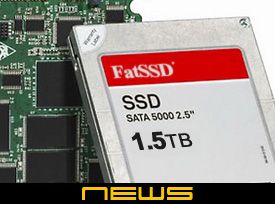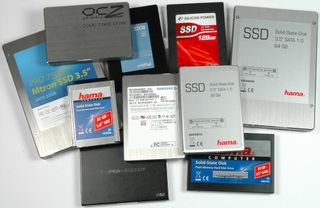SSDs Replacing HDDs Soon? Not A Chance

Poor capacities

Solid state drives are all the rage recently. But within the hype, the reality of having SSD drives dominate the market is a little far from actuality at this point. Of course, we're all excited about the potential of SSDs and the rate that manufacturers are improving on the technology make them increasingly delicious.
The buzz on the Internet however, is that SSDs will be taking over the internal storage market fairly soon. I'm going to have to go out on a limb here and say that this is just rubbish. Manufacturer marketing aside, traditional magnetic HDD storage will remain the dominant storage solution for a few more years to come--and I'm not talking about a paltry one to two years either.
Would I like to have SSDs in my laptop and my desktop? Absolutely. Would it make financial sense to do so at this point? No.
The fact of the matter is, HDDs have a huge leg up on SSDs in terms of storage and the cost per gigabyte. With 1.5 TB drives selling for less than $150 now, it just makes capacity sense to stay away from SSDs. In terms of size, there's just no comparison. With perpendicular recording technology now in the mainstream, HDDs will continue to get denser at an alarming rate. Manufacturers have stated that HDDs are expected to reach up to 10 TB in the next two to three years.
Right now, SSD drives are sitting typically at 128 GB and 256 GB options. I don't remember the last time drives of this size were popular--obviously too long ago. The race to cram more gigabytes is also escalating. With the cost of current SSDs, the technology remains out of the hands of most people. This however, is understandable and occurs with most new emerging technologies.
We took a quick look online to see what we could get for $150--nowadays a lot of green to pony up on storage. What we found was that a Transcend TS16GSSD25-S-J 16 GB drive was available for roughly that price. For about $30 less though, we're able to run off with a Seagate Barracuda 7200.11 ST31500341AS 1.5 TB HDD.
For archiving purposes, HDD storage capacities and prices beat SDDs hands down. There's absolutely no contest. While companies like Toshiba have announced 512 GB drives, they no doubt will cost both your arms and legs. Intel's zippy 32 GB SSDSA2SH032G1 X25-E Extreme costs a whopping $720.
Stay on the Cutting Edge
Join the experts who read Tom's Hardware for the inside track on enthusiast PC tech news — and have for over 25 years. We'll send breaking news and in-depth reviews of CPUs, GPUs, AI, maker hardware and more straight to your inbox.
-
animal_chin I dont see why you would pic the Transcend 16gb drive when there are 8 64gb ssds on newegg selling between $100 and $200. Infact the G.Skill 64gb drive for $139 got very good rviewsReply -
I think that by 2010 most semi-performance desktops will have a SSD as their primary hard drive with a large capacity HDD (I'm gonna guess 2.5 - 3 Tb) for storage. 256Gb is a HUGE ammount of space for an OS and programs and workspace (games, un-compressed media, etc.) and it's on your main drive that you want all your performance (loading times). It's all space vs. speed.Reply
-
TheGreatGrapeApe Not a fan of the idea that the utter annihilation of the opposition is required for 2009 to be the year of the SSD.Reply
They still made and had demand for (still do) CRTs long after it was the 'year of the LCD'.
C'mon, the year of the SSD is when they start making sense as a primary drive for many enthusiasts, not as a dump/data bulk drive for joe know-nuttin' who would buy a 4KRPM drive if he could to save $5 on his DELL build. The point at which people start thinking of getting an SSD as their primary drive (even if they have an HDD as their data drive), that's the year of the SSD. Heck the netbooks have started the opposite end of the trend along with devices like ipods/iphone, flash equipped smart devices, the era of the SSD is well under way.
And with the number of SDHC HD camcorders increasing and the demand for 32GB and 64GB cards increasing (*fixed M/GB typo), don't be surprised if slow (relative to others, 40MB/s isn't THAT slow) SSDs don't also start showing up to take the role of those large capacity external HDDs that usually already choke at 30MB/s due to the usual USB interface they are connected to. I suspect 2009 will be the last year for the HDD camcorders and the flash drives are the only thing left in 2010. SSDs replacing HDDs anytime soon? They already have. Just not all of them.
That HDDs relegate themselves to large storage roles makes it no less the year of the SSD than the continued presence of RJ-45/ethernet inhibits it being the era of wireless. -
Rob_L you also have to bear in mind that laptops have just taken over as the main PC type that people are buying... people care less about the capacity of the drives in their laptops. And drive capacity in most laptops is still relatively low anyway!Reply
Don't forget there are plenty of people out there still using PCs with drives of 20GB or even less anyway, and they're not exactly suffering. For most people 500GB is far more than they want or need.
And organisations don't want large amounts of data on their laptops either - they want PCs with small disks so that their users are FORCED to store the data in their document management systems or at least their big beefy central servers... which, yes, shockingly enough, will be running on HDDs for some time yet... -
V3NOM Replyone with a 128 GB SSD and one with a 1.5 GB SSD. Say also that there was a collection of movies that equated to roughly 1 TB of data.
1.5 TB not GB? -
It should say "Pretend that there are two identical machines, one with a 128 GB SSD and one with a 1.5 GB HDD".Reply
And why do you discount using SSD as a system/program drive for fast boot/load times while using the HDD as a "data" drive. I see this as a common theme in the early years especially if MS makes it easy to move all 'write-likely' files to a seperate volume (ie: registry, log files, inf's, cache's...). If the SSD is getting little work in the 'write-cycle' mode it will last a very long time. -
chriscusano Honestly, how many people use 1 terrabyte worth of storage? I'm using about 40 GB out of over 980 GB.....not everyone stores tons of music and movies on their pc's. So I don't think dvd 'access time' is really a fair measurement for those who don't watch movies on their computers. I believe the real issues that need to be addressed and benchmarked and would make an awesome article would be:Reply
1) The reliability issue of using an SSD for OS & programs for 5+ years at heavy usage
2) Price comparison between different SSDs, velicoraptors, and different raid and scsi configurations
3) SSD speed vs running cheap raid 0 striping configurations (I use 2 Hitatchi HDT725032vla's 320 gb for under $50 a piece on a 780i nforce board and I'm pretty satisfied) and more expensive raid setups such as with scsis, velicorpaters, and cheetahs
4) The difference between the two main types of ssds
I think this would make a great article.
If a reliable ssd of ~64 GB for under $200 could be had and would beat out raid configurations of similar prices, then I believe it would prove worthwhile. So the question really remains, for program and OS usage, can we use SSDs for superior performance at reasonable prices. We can even consider store temp folders and the paging file off on another HDD. And of course, if you need your movies, you put them on one of these massive 1-1.5 TB HDDs for under $150. Thanks and I'd love to see something like this!
-Chris -
MarkG "Honestly, how many people use 1 terrabyte worth of storage?"Reply
I was going to build myself a NAS server to offload all my data onto rather than having it on various hard drives, tapes and optical disks, but pretty soon realised that 3TB of RAID just wasn't enough to be worthwhile. At 4-8GB per DVD, and 13GB per DV tape, a terabyte vanishes pretty damn fast.
Sure, not everyone needs that much storage, but once you have the ability to put so much of your digital data onto one system -- and, more importantly, never having to delete anything -- you start to wonder how you ever lived without it. And with video sizes ever increasing, 10TB won't seem so large by the time it hits the market; I've been looking at the new low-end Red camera, which burns through about 100GB per hour.
-
V3NOM look. the point of SSD's is not really for enthusiasts or people looking to have 1 TB of fast hard drive... think 1 SSD has the performance of like thousadns of dollars worth of enterprise RAID hard drives! for servers, the fast access and lower power usage/heat is VERY VERY VERY CHEAP. in a few years like most things it will become mainsteam though :)Reply -
giovanni86 i AM USEING A 1TB AND SO FAR AM USEING AROUND 250GB'S AND I AM NOT STOPPING THERE. IT WILL BE FULL BY THE END OF 2009 ALL ON JUST pc GAMES. gAMES ARE GETTING BIGGER. ssd'/ SUCK. EXPENSIVE AND THEY JUST SUCK RIGHT NOW FOR THE RPUICE. hdd'S WILL BE AROUND FOR A LONG LONG TIME TO COME.Reply
Most Popular

